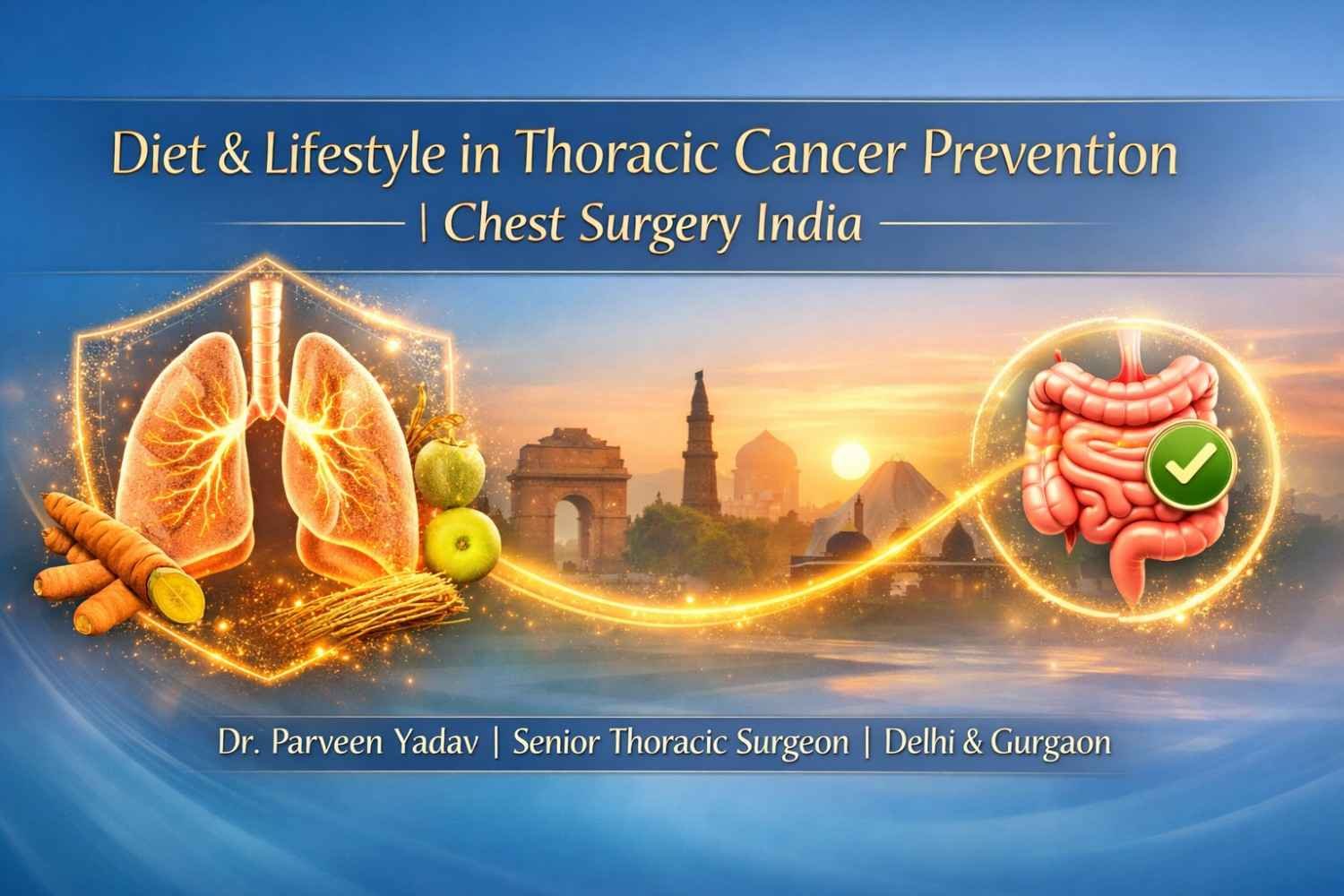

Understanding the various Esophageal cancer treatment modalities available is crucial for patients and their families as they navigate the challenges of diagnosis and treatment. Esophageal cancer is a formidable adversary, affecting thousands of individuals worldwide. This detailed blog will explore cutting-edge therapies, conventional approaches, and the importance of a multidisciplinary approach. If you want to know the diagnosis process, read our blog on A Comprehensive Guide to Diagnosing Esophageal Cancer.
Dr. Parveen Yadav is a renowned chest surgery specialist at Chest Surgery India. He believes in the importance of early diagnosis and individualized treatment for every patient. Esophageal cancer affects the esophagus, a muscular tube that moves food from the throat to the stomach.
Surgery is an essential part of the treatment of esophageal cancer. Dr. Yadav recommends precise surgical techniques to remove cancerous tissue while preserving esophageal function. Procedures like esophagectomy and minimally invasive surgeries have shown positive results.
Radiation therapy is a frequently used method for treating cancer. It involves high doses of radiation to target and destroy cancer cells. Typically, this treatment is administered before or after surgery to reduce the chances of the cancer reoccurring.
Firstly, Chemotherapy is a treatment that uses powerful drugs to destroy fast-growing cancer cells. While it is a systemic treatment affecting the entire body, Dr. Yadav discusses its significance in shrinking tumours before surgery or as a postoperative measure to eliminate remaining cancer cells.
Targeted therapies focus on specific molecules involved in the growth and spread of cancer cells. Dr. Yadav explains how these therapies can be tailored to the individual characteristics of the patient's cancer, potentially leading to more effective outcomes with fewer side effects.
Immunotherapy harnesses the body's immune system to combat cancer cells. We explore the latest developments in immunotherapy for esophageal cancer, highlighting its potential to enhance the body's natural defences against the disease.
Incorporating complementary therapies such as nutritional support, acupuncture, and psychosocial interventions is essential in promoting overall well-being during esophageal cancer treatment. Dr. Yadav stresses the importance of a holistic approach to patient care.
In conclusion, treating esophageal cancer effectively requires a thorough understanding of all available treatment options. Dr. Parveen Yadav and the dedicated team at Chest Surgery India emphasize the importance of personalized care to optimize outcomes. By staying informed about surgical interventions, radiation therapy, Chemotherapy, targeted therapies, and immunotherapy, patients and their families can make informed decisions on the path towards healing.
Remember, early detection and a multidisciplinary approach are essential in the battle against esophageal cancer. If you or a loved one is facing this diagnosis, consult with experts like Dr. Yadav to explore the most suitable treatment plan for your unique situation.
Q1: Could you please clarify the risk factors that might increase the chances of developing esophageal cancer?
A: Risk factors include tobacco and alcohol use, obesity, acid reflux, and certain medical conditions.
Q2: How is esophageal cancer diagnosed?
A: Diagnosis involves a combination of endoscopy, biopsy, imaging tests, and staging to determine the disease's extent.
Q3: Can esophageal cancer be prevented?
A: While not entirely preventable, adopting a healthy lifestyle, managing reflux, and regular screenings can reduce the risk.
Q4: Are there alternative therapies for esophageal cancer?
A: While alternative therapies may complement traditional treatments, they should be discussed with the medical team for safety and efficacy.
Q5: What is the prognosis for esophageal cancer?
A: Prognosis varies based on the stage at diagnosis, treatment response, and individual factors. Early detection improves outcomes.

18+ Yrs Exp | 5,700+ Thoracic & Robotic Cancer Surgeries
Dr. Parveen Yadav is a Director and Senior Consultant in Thoracic and Surgical Oncology, specializing in minimally invasive and robotic lung and esophageal surgeries, with advanced training from AIIMS and Tata Memorial Hospital.
View Full Profile Pain After Thoracic Surgery: Tips for Smooth Recovery
Pain After Thoracic Surgery: Tips for Smooth Recovery
 Diet & Lifestyle for Thoracic Cancer Prevention | Dr. Parveen Yadav
Diet & Lifestyle for Thoracic Cancer Prevention | Dr. Parveen Yadav
 Robotic Thoracic Surgery: How Da Vinci Technology is Revolutionizing Chest Procedures
Robotic Thoracic Surgery: How Da Vinci Technology is Revolutionizing Chest Procedures
Struggling with pain after chest surgery? Dr. Parveen Yadav shares expert recovery tips, causes of shoulder pain, PTPS signs, and what your discharge sheet won't tell you.
Discover how diet, breathing exercises & daily habits help prevent and recover from thoracic cancer. Expert insights from Dr. Parveen Yadav, Chest Surgery India
Discover how Da Vinci robotic surgery is transforming chest procedures in Gurgaon. Less pain, faster recovery & expert care by a certified thoracic surgeon
Copyright 2026 © Dr .Parveen Yadav all rights reserved.
Proudly Scaled by Public Media Solution!